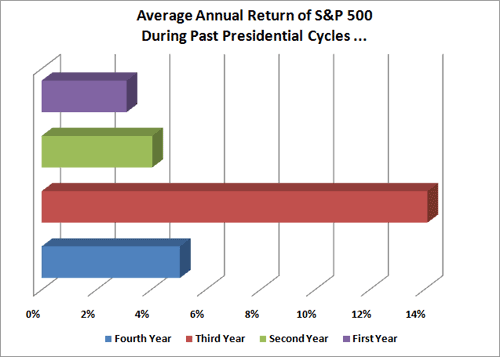One Reason to Bet on U.S. Stocks in 2011
Stock-Markets / Stock Markets 2011 Dec 28, 2010 - 09:25 AM GMTBy: Nilus_Mattive
 There are definitely plenty of reasons to be concerned about the U.S. economy — and the broad market — in the year ahead.
There are definitely plenty of reasons to be concerned about the U.S. economy — and the broad market — in the year ahead.
But as I prepare my strategy for the coming year, there’s an area that clearly argues for being bullish on stocks in 2011 … and it’s probably not one you’d expect …
I’m talking about the political climate in Washington!
As I told my Income Superstars subscribers last month …
The Presidential Cycles Argue for Strong Gains from U.S. Shares in 2011!
I’ve written about the so-called “Presidential Cycles” before, which I follow closely.
But just as a refresher: I keep a spreadsheet of S&P 500 market data that goes all the way back to 1928, and it’s organized in a way that allows me to see how various political climates affected market returns over most of the 20th Century.
So what does this data say about the stock market under different presidencies?
In short, next year should prove to be a very good one!
The third year of a president’s term is typically the strongest — producing an average annual gain of 14.12 percent for the S&P 500. And under Democratic leadership, that number moves even higher to an average gain of 17.7 percent!
Take a look …

Why is the third year so magical? Probably because investors have had a chance to thoroughly digest the new administration’s policies. Moreover, many of those policy changes have had plenty of time to get implemented.
In contrast, the first year of a president’s term — which is full of uncertainty — is usually the worst, producing an average gain of just 3.1 percent!
Other studies support this notion, especially when the focus narrows to a first-term president’s third year. Since 1945, the Dow Jones Industrial Average has gained an average of 19 percent in such cases compared with just 7.9 percent for all years over that period. The data also points to better overall gains for the third year of a first-term president than for the second-term president.
Of course, mid-term elections have also ended by the beginning of the third year, removing yet another cloud of uncertainty. Which brings me to November’s results, and how they might play into things …
While Gridlock Typically Tempers Stock Market Gains, It Also Argues for Lower Interest Rates …
There have been five times in the past eight decades when a president controlled both houses of Congress and then lost at least one of them. However, it’s hard to discern a real trend since the stock market’s historical reaction ranged from massive gains to big losses.
What I can say with more certainty is that a divided Congress has not been mildly positive for stocks at best.
I say that because the S&P 500 has risen an average of 4 percent under Congressional gridlock … twice that much when the divide was only between Congress and the White House … and nearly three times as fast when one party ruled the whole roost!
Meanwhile, based on data from the last 50 years, 10-year Treasury prices have typically risen more when Republicans have controlled at least one house of Congress.
In other words, all other things being equal, we should expect interest rates to drop further in the coming year.
Obviously, this cycle has been anything but normal, and anything can happen next. But at the very least, history gives us one reason to remain positive on dividend stocks in 2011.
Best wishes,
Nilus
This investment news is brought to you by Money and Markets. Money and Markets is a free daily investment newsletter from Martin D. Weiss and Weiss Research analysts offering the latest investing news and financial insights for the stock market, including tips and advice on investing in gold, energy and oil. Dr. Weiss is a leader in the fields of investing, interest rates, financial safety and economic forecasting. To view archives or subscribe, visit http://www.moneyandmarkets.com.
© 2005-2022 http://www.MarketOracle.co.uk - The Market Oracle is a FREE Daily Financial Markets Analysis & Forecasting online publication.



